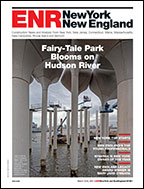State-level public works face different challenges than do larger federal public works when it comes to performing due diligence against surety-bond fraud. For federal contracts, prime contractors can require subcontractor bonds from Treasury-listed or A.M. Best-rated sureties and check the surety in a federal public database, which helps. State and local public works don't require the federal level of scrutiny,
and contracts between primes and subs are private, so due diligence mostly involves meetings and financial record reviews.
If a concerned contractor wants to search for cease-and-desist orders issued by state insurance regulators against a surety, the contractor has a Herculean task: sifting through 51 different state insurance-department websites with different structures. They often are difficult to navigate and sometimes entirely broken. The Wyoming Dept. of Insurance website, for one, lists only cease-and-desist orders from 2013, while links for other years lead to blank tables. Others states have problems likely to frustrate users.
As shown in recent stories in ENR, small-contract surety fraud is flourishing and cries out for a practical solution. A nationwide database of enforcement orders filed by all state insurance departments would help remedy this particular problem by providing vital information about state enforcement actions. One search for a surety's name would return all cease-and-desist orders filed against that surety, allowing contractors to ascertain that the surety has operated lawfully in states in which it is authorized.
An Existing Resource
A resource like this already exists: the Regulatory Information Retrieval System, which is administered by the National Association of Insurance Commissioners.
It contains all orders issued by any insurance departments against sureties and agents, but, unfortunately, RIRS is available only to insurance regulators and federal contracting officers. Another NAIC database, the Suspicious Activities Database, allows insurance regulators to report their suspicions of insurance fraud for other insurance regulators to consider. Making the latter database public would pose a number of legal problems, but the former comprises information that is intended to be publicly available. NAIC has yet to respond to ENR's inquiries about RIRS.
Surety industry representatives point to the potential of a nationwide database to help contractors protect themselves and to help bond producers refer businesses to reputable sureties—all with the caveat that unscrupulous individual sureties are known to change names as often as they change jurisdictions, rendering a database search fruitless. A database of cease-and-desist orders would not be able to prevent the distribution of fraudulent bonds.
Nevertheless, state insurance departments are a key player in solving the problem of surety fraud. Regulators should be responsible for providing the public a convenient information tool for cease-and-desist orders. A simple, searchable database would create a better small-surety market in every state.




Post a comment to this article
Report Abusive Comment